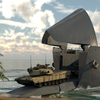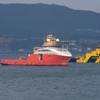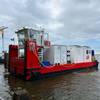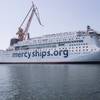Bollinger Means Business
Chris Bollinger sets the table for an exciting 2013 & beyond.
Maritime Reporter caught up with Chris Bollinger on a recent trip to the Gulf Coast for the October 26, 2012, christening of Bollinger’s latest newbuild; the first two of four tugboats in Crowley Maritime’s ocean class series, Ocean Wave and Ocean Wind. Directly on the heels of those two hulls are the next in series; Ocean Sun and Ocean Sky. The event, attended by more than 250 guests and employees from both the Crowley and Bollinger families, underscored the upbeat mood at the diverse, Gulf Coast shipbuilding and repair group.
The most visible manifestations of the recent uptick of business at Bollinger include the U.S. Coast Guard Fast Response Cutter (FRC) program, the ongoing Crowley series newbuild effort and the recently announced Hornbeck Marine retrofit program, a project that will upgrade and stretch six of its 200 class DP-1 new generation OSVs into 240 class DP-2 OSVs. The Bollinger group, spanning 10 different U.S. Gulf Coast locations, clearly has its hands full, but Chris Bollinger, Executive Vice President, isn’t complaining. “I haven’t been this excited about domestic shipbuilding in a long time.”
Manufacturing Efficiency & Productivity
Bollinger said that shipbuilding at the companies yards has evolved into “manufacturing.” He explains, “Bollinger has been building ships for over 65 years and we have continuously focused on improving our processes to increase efficiency and productivity. In our shipyard we define the manufacturing process through the many manufacturing workstations that allow us to progressively build our vessels. Each workstation has a very specific function where we attempt to standardize the work content at that workstation. By taking this approach it allows us to capitalize on moving the work to our people, rather than moving people to the work.” He adds, “We determined that once we established a standard way of manufacturing a component of a vessel, regardless of type or size of the vessel, we could eliminate waste and reduce man-hours, which is the most critical aspect of the manufacturing process.”
The manufacturing process at Bollinger is clearly an important ingredient to its success. Chris Bollinger concedes, however, that workforce development may well be the most important part of his business plan. “It is true that the development of a skilled workforce is our most important focus today in order to meet the future demands,” he said, “and at Bollinger we are always exploring new opportunities for workforce development. We begin this process by visiting with middle schools, high schools and vocational schools to inform students and get them interested in a career with Bollinger Shipyards.”
The company’s recruitment efforts include participation in the development of a standardized ship fitting boot camp, the National Maritime Education Council, administering apprentice programs for adults and for high school students that teach skills necessary shipbuilding skills, providing extensive paid on the job training for skill development and working with Louisiana Economic Development’s Fast Start division as well as other government agencies to explore other opportunities to attract and develop and retain a skilled workforce.
Casting a Wide Net
Bollinger Shipyards perhaps have one distinct advantage in the competitive Gulf Coast build and repair game. In terms of geographic presence alone, Bollinger may have no rival, giving the firm opportunities to serve a wide range of what Chris Bollinger characterizes as “opportunity jobs.” That, by itself, itself isn’t enough, and Bollinger knows it. “Our 10 facilities service a diverse customer base, ranging from the Coast Guard to inland operators to offshore operators in the Oil & Gas industry, as well as bluewater operators. Our 28 dry-docks alone give us the ability to accommodate customers in a variety of marine industries. Our facility utilization is directly affected by the activity in the industry, and we do see an uptick in our utilization and backlog, based on predicted increase in activity in the Gulf of Mexico.”
Bollinger aims to continue that trend. He adds, “We continue to invest in the future, replacing aging tonnage, modernizing facility infrastructure, and working with our customers to better understand their needs. Our Quality and HSE programs are paramount, and we use this as a precision tool with our customers to insure that we get it right, the first time.” He reports that its Fourchon location was active with inquiries and commitments for several vessels and jack-up rigs scheduled to enter the facility for repairs.
Upbeat about the Uptick
Chris Bollinger’s optimism is well-founded, as he explained. “The shipyard industry experienced a lack of orders for domestic shipbuilding after the BP accident, and customers were hesitant to place new orders due to political climate and Administration’s policies. Deepwater and shelf optimism has returned, and many of the operators have placed multiple contracts for multiple large OSV’s. Other markets such as the Inland waterways and River market continue to replace tonnage. Markets such as the oil transportation sector once again are looking at future transportation modes and the development of the fleets for the future. With all of this positive activity, domestic shipyards are filling their capacities with backlogged work into the foreseeable future.”
The “S” Word
Sequestration, or as Gulf Coast shipbuilders call it, the “S” word, is the proverbial 600-pound gorilla in the room. It costs money to put together a competent bid, and when awards don’t materialize as promised, it can cripple a firm too closely tied to government work. Bollinger is well aware of these realities, and brought up a few more. “First of all, sequestration is a huge concern for all involved in government contracting. This will not only impact shipbuilding, but can cripple our defense and homeland security departments’ abilities to perform their duties in protecting our nation. For the last 30 years, Bollinger has been blessed with steady work from both the commercial and government markets. Much of the balance is dependent on customer needs at that time. Government contracts tend to have long lead time from development of need, to proposal effort, through to award and construction. Plenty of time and money are involved in the Government proposal effort. On the other hand, commercial proposals and contracts can be developed and awarded much quicker. It is nice to have a balance of both government and commercial work. There have been times when our entire backlog was all Government work, and other times when it was all commercial work. A unique capability of Bollinger is our ability to perform Government and Commercial work in the same yard at the same time.”
OPC: Bollinger, the Quiet Company
The race to build OPC is on, but Bollinger, having announced its team, isn’t saying much else. Where others have been increasing vocal about their entries, Bollinger has taken a noticeably lower key approach. The Bollinger team, nevertheless – Damen (proven, durable hull forms) and Gibbs & Cox for design (extensive U.S. government, Coast guard and U.S. Navy experience) – will present a formidable case to the Coast Guard’s decision team. Bollinger would say only, “We are excited about the OPC program and our team, but it is hard to comment too much as there is a competition going on.”
Notwithstanding the tight-lipped position on OPC at Bollinger, the Gulf Coast boatbuilder appears to be as well-positioned as anyone for the prize. Looking at the FRC program, for example, and with 18 hulls under contract, three already delivered, and 10 more in production, Bollinger is more than proving its mettle in the race.
Family Business
A prominent theme that emerged during October’s Ocean Class christening ceremony was the “Family” metaphor shared by both the Crowley and Bollinger families. For example, Chairman and CEO Boysie Bollinger talked of building a family “Brand,” leveraging the longevity of both firms. For his part, Tom Crowley made sure that the officers and crew of both vessels had a special and prominent place in the day’s festivities. After the ceremony, Chris Bollinger reflected on those values and offered, “Bollinger Shipyards is about family. Not only a Bollinger family business, but our employees and customers are our families. This is the atmosphere created by my grandfather, and this philosophy continues today. It’s about treating people with respect. It’s about ethics and values. It’s about character – doing the right thing when no one else is looking.”
Internally at this Bollinger, that philosophy seems to alive and well; paying dividends on a daily basis.
(As published in the November 2012 edition of Maritime Reporter - www.marinelink.com)










